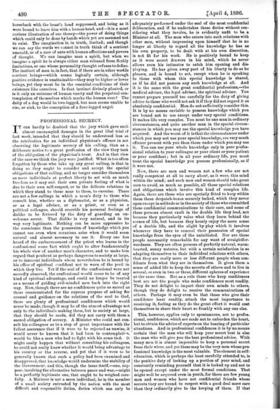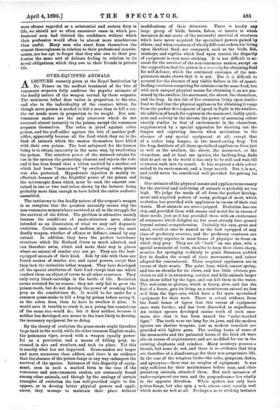PROFESSIONAL SECRECY.
IT can hardly he doubted that the jury which gave such almost unexampled damages in the great libel trial of last week, intended that they should be understood less as the retribution for an individual physician's offence in not observing the legitimate secrecy of his calling, than as a deliberate notice to a great profession of the view they took of the obligation of the physician's trust. And in that view of the case we think the jury were justified. What is too often forgotten by those who take up any great calling, is that in doing so they ought to consider and accept the special obligations of that calling, and no longer consider themselves as mere individuals at perfect liberty to act with as much freedom as it may suit their own private feeling of what is due to their own self-respect, or to the delicate relations in which they stand to those near to them, to exercise. There are not a few callings in which a man's duty to those who consult him, whether as a diplomatist, or as a physician, or as a legal adviser, or as a priest, or even as a political colleague, should override his personal feelings of dislike to be fettered by the duty of guarding an un- welcome secret. That dislike is very natural, and in its way very legitimate. Nothing can be more oppressive to the conscience than the possession of knowledge which you cannot use even when occasions arise when it would seem natural and almost necessary to use it. Every one has beard of the embarrassment of the priest who learns in the confessional some fact which ought to alter fundamentally his whole view of another man's character, and to make him regard that penitent as perhaps dangerous to society at large, or to innocent individuals whom nevertheless be is bound by his office of spiritual confidant not to warn of the peril in which they live. Yet if the seal of the confessional were not sacredly observed, the confessional would cease to be of any kind of spiritual advantage, and could no longer be treated as a means of guiding evil-minded men back into the right way. Now, though there are no confidences quite so sacred as those communicated for the express purpose of asking for counsel and guidance on the relations of the soul to God, there are plenty of professional confidences which would never be made, though it may be of the utmost advantage not only to the individuals making them, but to society at large, that they should be made, did they not carry with them a sacred obligation of secrecy. A Minister who could not con- sult his colleagues as to a step of great importance with the fullest assurance that if it were to be rejected as unwise, it would never be known that it had been in contemplatirn. would be like a man who had to fight with his arms tied. It might easily happen that without consulting his colleagues, he could not really know whether it would bring advantage to his country or the reverse, and yet that if it were to be generally known that such a policy had been examined and disapproved, that knowledge would undermine the stability of the Government. and this, though the issue itself,—one, sup- pose, involving the alternative between peace and war,—might be a perfectly legitimate one, that ought to be weighed care- fully. A Minister is not a mere individual, he is the member of a small society entrusted by the nation with the most difficult and responsible duties, duties which can only be
adequately performed under the seal of the most confidential deliberation, and if he undertakes these duties without con- sidering what they involve, he is evidently unfit to be a Minister at all. The man who enters into such relations with other men, without impressing upon himself that he is no longer at liberty to regard all the knowledge he has as his own property, to be dealt with at his own discretion, is not fit for his work. He is positively bound to keep as it were secret drawers in his mind, which he never allows even his intimates to catch him opening and dis- playing. He has given away part of his liberty to do as he pleases, and is bound to act, except when he is speaking to those with whom this special knowledge is shared, as if he did not possess any such knowledge at all. And it is the same with the great confidential professions,—the medical adviser, the legal adviser, the spiritual adviser. You cannot prepare yourself too carefully for the duty of giving advice to those who would not ask it if they did not regard it as absolutely confidential. Men do not sufficiently consider this. It is by no means enviable to possess knowledge which you are bound not to use except under very special conditions. It makes life very complex. You must be one man in ordinary circumstances, and quite another man in the special circum- stances in which you may use the special knowledge you have acquired. And the worst of it is that the circumstances under which you may not use your special knowledge, are very much oftener present with you than those under which you may use it. You can use your whole knowledge only in your profes- sional relation to your colleague or your client or your patient or your confidant ; but in all your ordinary life, you must treat the special knowledge you possess professionally, as if it were not.
Now, there are men and women not a few who are not really competent at all to carry about, as it were, this mind within the mind; and such men and women should take great care to avoid, as much as possible, all those special relations and obligations which involve this kind of complex life. Again, there are those who are specially fitted to keep within them these despatch-boxes securely locked, which they never open except in solitude or in the society of those who committed these confidential communications to their care, and some of these persons almost exult in the double life they lead, not because they particularly value what they learn behind the scenes of life, but because they keenly enjoy the mere sense of a double life, and the slight byplay which it involves whenever they have to conceal their possession of special knowledge from the eyes of the uninitiated. Nor are these people necessarily remarkable for any want of straightfor- wardness. They are often persons of perfectly natural, warm- hearted, sunny natures, but with a certain satisfaction in so adapting themselves to their individual relations with others, that they are really more or less different people when con- fidants from what they are in themselves. It gives them a sense of added life to keep the secrets of others and to live in several, or even in two or three, different spheres of experience at the same time. But as a rule those who keep confidences best are not the people who make confidences most readily. They do not delight to impart their own minds to others, though they do delight to receive the communications of others. Perhaps it may even be that those who give their confidence least readily, attach the most importance to receiving it, feeling as they do the great effort it would cost themselves to share their heart so frankly with any one else.
This, however, applies only to spontaneous, not to profes- sional, confidences, which are made not to unburden the heart, but to obtain the advice of experts on the bearing of particular situations. And in professional confidences it is by no means certain that the man who will keep your secret best is also the man who will give you the best professional advice. With many men it is almost impossible to keep a personal secret from their wives, and yet these may be the very men whose pro- fessional knowledge is the most valuable. The element in self- education, which is perhaps the least carefully attended to, is the positive duty of locking up a portion of your mind, and constantly reminding yourself that it is locked up and not to be opened except under the most formal conditions. That might well be acquired even in youth, for there are few young men and women who have not confidential friends whose secrets they are bound to respect with a good deal more care than they ordinarily give to the keeping of them. If that were oftener regarded as a substantial and serious duty in life, we should not so often encounter cases in which pro- fessional men had violated the confidence without which their profession would often be almost more mischievous than useful. Many men who exact from themselves the utmost thoroughness in relation to their professional acquire- ments, are too apt to forget that they also owe to their pro- fession the same sort of delicate feeling in relation to its moral obligations, which they owe to their friends in private life.



































 Previous page
Previous page